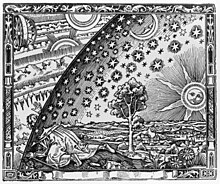Epiphany (feeling)
An epiphany (from the ancient Greek ἐπιφάνεια, epiphanea, "manifestation, striking appearance") is an experience of a sudden and striking realization. Generally the term is used to describe a scientific breakthrough or a religious or philosophical discovery, but it can apply in any situation in which an enlightening realization allows a problem or situation to be understood from a new and deeper perspective. Epiphanies are studied by psychologists[1][2] and other scholars, particularly those attempting to study the process of innovation.[3][4][5]
Epiphanies are relatively rare occurrences and generally follow a process of significant thought about a problem. Often they are triggered by a new and key piece of information, but importantly, a depth of prior knowledge is required to allow the leap of understanding.[3][4][6][7] Famous epiphanies include Archimedes's discovery of a method to determine the volume of an irregular object ("Eureka!") and Isaac Newton's realization that a falling apple and the orbiting moon are both pulled by the same force.[6][7][8]
History
The word epiphany originally referred to insight through the divine.[9][10] Today, this concept is more often used without such connotations, but a popular implication remains that the epiphany is supernatural, as the discovery seems to come suddenly from the outside.[9]
The word's secular usage may owe much of its popularity to Irish novelist

In traditional and pre-modern cultures,
Process
Epiphanies can come in many different forms, and are often generated by a complex combination of experience, memory, knowledge, predisposition and context. A contemporary example of an epiphany in education might involve the process by which a student arrives at some form of new insight or clarifying thought.[12] Despite this popular image, epiphany is the result of significant work on the part of the discoverer, and is only the satisfying result of a long process.[13] The surprising and fulfilling feeling of epiphany is so surprising because one cannot predict when one's labor will bear fruit, and our subconscious can play a significant part in delivering the solution; and is fulfilling because it is a reward for a long period of effort.[4][13]
Myth
A common myth predicts that most, if not all, innovations occur through epiphanies.[6] Not all innovations occur through epiphanies; Scott Berkun notes that "the most useful way to think of an epiphany is as an occasional bonus of working on tough problems."[7] Most innovations occur without epiphany, and epiphanies often contribute little towards finding the next one.[7] Crucially, epiphany cannot be predicted, or controlled.[7]
Although epiphanies are only a rare occurrence, crowning a process of significant labor, there is a common myth that epiphanies of sudden comprehension are commonly responsible for leaps in technology and the sciences.
Another myth is that epiphany is simply another word for (usually spiritual) vision. Actually, realism and psychology make epiphany a different mode as distinguished from vision, even though both vision and epiphany are often triggered by (sometimes seemingly) irrelevant incidents or objects.[8][14]
In religion
In Christianity, the Epiphany refers to a realization that Christ is the Son of God. Western churches generally celebrate the
In more general terms, the phrase "religious epiphany" is used when a person realizes their faith, or when they are convinced an event or happening was really caused by a deity or being of their faith. In Hinduism, for example, epiphany might refer to
See also
- Anagnorisis
- Apophenia
- Eureka effect
- Hierophany
- Kenshō
- Lateral thinking
- Peripeteia
- Revelation
- Satori
- Samadhi
- Theophany
References
- ^ Arianna Jarvis (1996). "Taking a break: Preliminary investigations into the psychology of epiphanies as discontinuous change experiences". Doctoral Dissertations Available from Proquest. University of Massachusetts-Amherst: 1–296. Retrieved 19 September 2012.
- S2CID 145519751. Retrieved 19 September 2012.
- ^ ISBN 978-1-4493-8962-8. Retrieved 15 October 2011.
- ^ ISBN 978-1-4493-8962-8. Retrieved 15 October 2011.
- ISBN 978-0-387-71801-9. Retrieved 16 October 2011.
- ^ ISBN 978-1-59184-223-1. Retrieved 16 October 2011.
- ^ ISBN 978-1-4493-8962-8. Retrieved 15 October 2011.
- ^ ISBN 978-90-420-0636-2. Retrieved 16 October 2011.
- ^ ISBN 978-1-4493-8962-8. Retrieved 15 October 2011.
- ^ Platt, V. J. (2011) Facing the Gods. Epiphany and Representation in Graeco-Roman Art, Literature and Religion. Cambridge University Press.
- ^ Morris Beja, Epiphany in the Modern Novel. Seattle: University of Washington Press, 1971. P. 18.
- S2CID 16905317.
- ^ ISBN 978-1-4493-8962-8. Retrieved 15 October 2011.
- ISBN 978-1-4493-8962-8. Retrieved 15 October 2011.
- ^ "The Season of Epiphany". Crivoice.org. 2011-10-11. Retrieved 2011-10-16.


